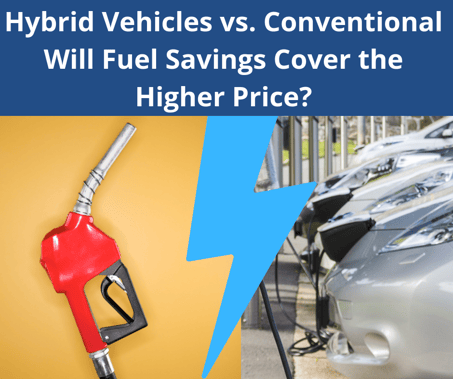Hybrid vehicles continue to capture more market share, but remain a small fraction of all vehicles sold. Due to federal fuel economy standards that require a manufacturer's average fuel economy to reach 54.5 mpg by 2025, car manufactures will continue building more hybrids.

If you are in the market to buy a new car and are debating between the conventional model and the hybrid model, I did some research to help you answer the question, "Will the better fuel economy of a hybrid over time offset the higher initial cost?". To answer this question, I compared the MSRP base model of the conventional and hybrid versions, the average price of gas, and the average miles driven per year to reveal the break-even point.
Because Toyota is an established builder of hybrids (having introduced the Prius in 2001) I used three Toyota models; Lexus RX350 and RX450h, Toyota Camry L and Camry Hybrid and Highlander 4WD and 4WD Hybrid.
Assumptions:
- I used 2019 suggested retail prices (MSRP) for the base model of each version, assuming any discounts from MSRP would be equivalent among the different models. I did not include finance charges in the price differences.
- I used 14,000 miles driven per year and a price of $2.65/gallon of gas (both recent year averages). The Lexus RX450h requires premium fuel so for that model the fuel cost was figured at $3.1/gallon.
- Price difference divided by gas savings per year = payback period in years.
Results:
Lexus RX350/450H
- MSRP difference: $2,425
- Payback: All City Driving: 5.9 years
- Payback: All Highway Driving: Never (both offer 28 mpg highway)
- Payback: Combined Driving: 48.5 years
Camry L/Hybrid
- MSRP difference: $4,305
- Payback: All City Driving: 7.8 years
- Payback: All Highway Driving: 21 years
- Payback: Combined Driving: 12.4 years
Highlander/ Highlander Hybrid
- MSRP difference: $5,640
- Payback: All City Driving: 10.6 years
- Payback: All Highway Driving: 115 years
- Payback: Combined Driving: 21.1 years
Conclusions:
- If you do almost all city driving and plan to keep your car for many years, a hybrid is a good choice financially.
- If you do almost all highway driving the difference in mpg between a hybrid and conventional is not enough to create a reasonable payback period (note 115 years to pay off the difference in the Highlander for highway driving).
- If you do a combination of city and highway driving it will likely take a long time to recuperate the difference in cost, but in generally smaller vehicles will take a shorter time.
- Of course, keep in mind if you drive less than 14,000 miles a year the payback will be longer and if you drive more (as long as it isn't highway driving) the payback period will be shorter. The same is true for the price of gas; a higher gas price equates to shorter payback and vice versa.
There are many reasons people purchase hybrids, cost being only one of them, so I hope this information helps to inform your decision. As always, if you're not sure or you have questions, you can always contact us. We've been serving the Denver area for more than 35 years.



